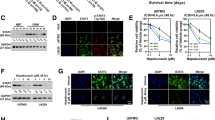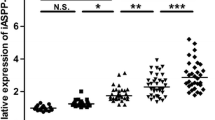Abstract
We have previously reported that As2O3 affected cell cycle progression and cyclins D1 and B1 expression in two glioma cell lines differing in p53 status (U87MG-wt; T98G-mutated). In the present study, we further demonstrated that As2O3 affected proliferation, viability and apoptosis of the two cell lines in a dose- and time-dependent manner, and T98G cells were more sensitive than U87MG cells to As2O3 -induced apoptosis and inhibition of proliferation and viability. We further investigated the expression profiles of genes related with apoptosis and cell cycle in the two cell lines with a human cDNA-microarray (SuperArray) spotted with 267 genes of apoptosis and cell cycle. Thirty five genes were upregulated and 15 genes downregulated at least 2-fold by As2O3 in U87-MG cells; whereas, 38 genes were upregulated and 21 genes downregulated at least 2-fold in T98G cells by As2O3. After As2O3 treatment, p53 expression was upregulated 56.5-fold in T98G cells, but only 6.0-fold in U87MG cells. The results indicate that As2O3 suppresses the growth of U87MG cells mainly by regulating expression of genes of cell cycle arrest, stress and toxicity; whereas As2O3 affects T98G cells mainly by regulating expression of genes belonging to Bcl-2, tumor necrotic factor receptor and ligand families. The data may be helpful for optimizing As2O3 as an anti-cancer drug in the treatment of gliomas.



Similar content being viewed by others
References
Burton EC, Prados MD (2000) Malignant gliomas. Curr Treat Options Oncol 1(5):459–468
Avgeropoulos NG, Batchelor TT (1999) New treatment strategies for malignant gliomas. Oncologist 4(3):209–224
Antman KH (2001) Introduction: the history of arsenic trioxide in cancer therapy. Oncologist 6(S2):1–2
Kim JH, Lew YS, Kolozsvary A et al (2003) Arsenic trioxide enhances radiation response of 9L glioma in the rat brain. Radiat Res 160(6):662–666
Ning S, Knox SJ (2004) Increased cure rate of glioma using concurrent therapy with radiotherapy and arsenic trioxide. Int J Radiation Oncology Biol Phys 60(1):197–203
Dai J, Weinberg SR, Waxman S, Jing Y (1999) Malignant cells can be sensitised to undergo growth inhibition and apoptosis by arsenic trioxide through modulation of the glutathione redox system. Blood 93(1):268–277
Chen YC, Lin-shiau SY, Lin JK (1998) Involvement of reactive oxygen species and caspase 3 activation in arsenic-induced apoptosis. J Cell Physiol 177(2):324–333
Park WH, Seol JG, Kim ES et al (2000) Arsenic trioxide-mediated growth inhibition in MC/CAR myeloma cells via cell cycle arrest in association with induction of cyclin-dependent kinase inhibitor, p21, and apoptosis. Cancer Res 60(11):3065–3071
Zhu XH, Shen YL, Jing YK et al (1999) Apoptosis and growth inhibition in malignant lymphocytes after treatment with arsenic trioxide at clinically achievable concentrations. J Natl Cancer Inst 91(9):772–778
Kanzawa T, Kondo Y, Ito H et al (2003) Induction of autophagic cell death in malignant glioma cells by arsenic trioxide. Cancer Res 63(9):2103–2108
Kanzawa T, Zhang L, Xiao L et al (2005) Arsenic trioxide induces autophagic cell death in malignant glioma cells by upregulation of mitochondrial cell death protein BNIP3. Oncogene 24(6):980–991
Zhao S, Tsuchida T, Kawakami K et al (2002) Effect of As2O3 on cell cycle progression and cyclins D1 and B1 expression in two glioma cell lines differing in p53 status. Int J Oncol 21(1):49–55
Ullrich SJ, Mercer WE, Appella E (1992) Human wild-type p53 adopts a unique conformational and phosphorylation state in vivo during growth arrest of glioma cell. Oncogene 7(8):1635–1643
Vogelstein B, Lane D, Levine AJ (2000) Surfing the p53 network. Nature 408(6810):307–310
Hofseth LJ, Hussain SP, Harris CC (2004) p53:25 years after its discovery. Trends Pharmacol Sci 25(4):177–181
Lowe SW, Cepero E, Evan G (2004) Intrinsic tumor suppression. Nature 432(7015):307–315
Dynlacht BD (1997) Regulation of transcription by proteins that control cell cycle. Nature 389(6647):149–152
Taylor WR, Stark GR (2001) Regulation of the G2/M transition by p53. Oncogene 20(15):1803–1815
Akao Y, Nakagawa Y, Akiyama K (1999) Arsenic trioxide induces apoptosis in neuroblastoma cell lines through the activation of caspase3 in vitro. FEBS Lett 455(1–2):59–62
Kang YH, Yi MJ, Kim MJ et al (2004) Caspase-independent cell death by arsenic trioxide in human cervical cancer cells: reactive oxygen species-mediated poly (ADP-ribose) polymerase-1 activation signals apoptosis-inducing factor release from mitochondria. Cancer Res 64(24):8960–8967
Uslu R, Sanli UA, Sezgin C et al (2000) Arsenic Trioxide-mediated cytotoxicity and apoptosis in prostate and ovarian cell lines. Clin Cancer Res 61(12):4957–4964
Maeda H, Hori S, Nishitoh H et al (2001) Tumor growth inhibition by arsenic trioxide (As2O3) in the orthotopic metastasis model of androgen-independent prostate cancer. Cancer Res 61(14):5432–5440
Nakagawa Y, Akao Y, Morikawa H et al (2002) Arsenic trioxide-induced apoptosis through oxidative stress in cells of colon cancer cell lines. Life Sci 70(19):2253–2262
Kito M, Akao Y, Ohishi N et al (2002) Arsenic trioxide-induced apoptosis and its enhancement by buthionine sulfoximine in hepatocellular carcinoma cell lines. Biochem Biophys Res Commun 291(4):861–867
Zhang TC, Cao EH, Li JF et al (1999) Induction of apoptosis and inhibition of human gastric cancer MCG-803 cell growth by arsenic trioxide. Eur J Cancer 35(8):1258–1263
Pu YS, Hour TC, Chen J et al (2002) Arsenic trioxide as a novel anticancer agent against human transitional carcinoma characterizing its apoptotic pathway. Anticancer Drugs 13(3):293–300
Yu HY, Yang YL, Gao YY et al (2000) Effect of arsenic trioxide on human hepatoma cell line BEL-7402 cultured in vitro. World J Gastroenterol 6(5):681–687
Iwama K, Nakajo S, Aiuchi T, Nakaya K (2001) Apoptosis induced by arsenic trioxide in leukemia U937 cells is dependent on activation of p38, inactivation of ERK and the Ca2+-dependent production of superoxide. Int J Cancer 92(4):518–526
Acknowledgements
This work was supported in part by the National Natural Scientific Foundation of China (30471681, 30571808). Zhao S and Zhang J contributed equally to this work.
Author information
Authors and Affiliations
Corresponding author
Rights and permissions
About this article
Cite this article
Zhao, S., Zhang, J., Zhang, X. et al. Arsenic trioxide induces different gene expression profiles of genes related to growth and apoptosis in glioma cells dependent on the p53 status. Mol Biol Rep 35, 421–429 (2008). https://doi.org/10.1007/s11033-007-9102-6
Received:
Accepted:
Published:
Issue Date:
DOI: https://doi.org/10.1007/s11033-007-9102-6




